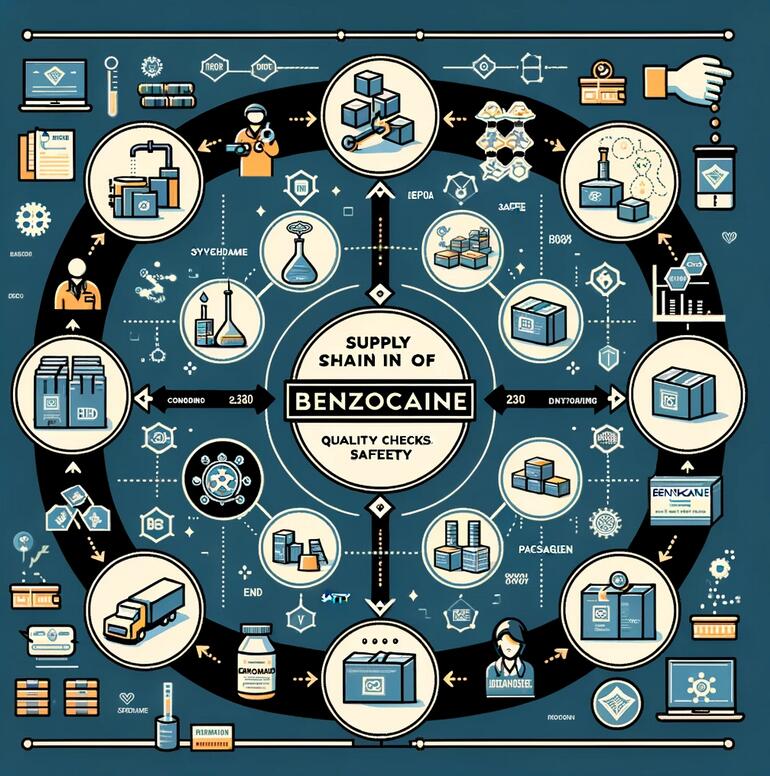Benzocaine Suppliers and Industry Standards: Ensuring Quality and Safety
I. Introduction
Benzocaine, a local anesthetic widely used in medical, dental, and consumer products, plays a crucial role in pain relief and minor surgical procedures. The global market for benzocaine is vast and varied, with suppliers playing a pivotal role. This article explores the intricate relationship between benzocaine suppliers and industry standards, emphasizing the importance of quality and safety in this sector.

II. Overview of Industry Standards for Benzocaine
Industry standards are not just guidelines but are essential benchmarks that ensure benzocaine's efficacy and safety. These standards, governed by international bodies like the FDA and EMA and national regulatory agencies, provide a framework for consistency in quality. They cover a range of criteria, from the chemical compound's purity to its production's environmental impact.
III. The Benzocaine Supply Chain
The journey of benzocaine from a laboratory to the consumer involves multiple stages. This includes synthesis of the compound, quality checks, packaging, and distribution. Each stage of the supply chain adheres to stringent quality and safety standards to ensure the final product meets the required specifications. However, this complex process has its challenges. Suppliers must navigate evolving regulations and ensure that every batch of benzocaine adheres to the highest standards.
IV. Spotlight on Leading Benzocaine Suppliers
The market is populated with numerous benzocaine suppliers, each striving to set themselves apart through quality and compliance. Leading suppliers invest heavily in research and development, state-of-the-art manufacturing processes, and robust quality control mechanisms. They often go beyond the mandated standards to ensure their products are compliant and superior in quality.
V. The Impact of Quality and Safety on the End-User
The adherence to quality and safety standards has a direct impact on the end-user. High-quality benzocaine ensures efficacy, reducing the risk of adverse reactions. On the other hand, substandard products can lead to significant health risks. Therefore, the responsibility of suppliers is immense, as their adherence to standards directly affects the health and safety of consumers.
In summary, the relationship between benzocaine suppliers and industry standards is a critical one. Ensuring quality and safety is a regulatory requirement and a moral obligation to consumers. As the industry evolves, so will the bars, and suppliers must stay ahead of the curve to continue providing safe and effective products.
VI. Future Trends in Benzocaine Supply and Regulation
As the pharmaceutical industry evolves, so do the trends and regulations governing benzocaine supply. Anticipating future changes is crucial for suppliers to stay compliant and competitive. Emerging technologies, such as advanced synthesis methods and digital tracking systems, are set to revolutionize the way benzocaine is produced and distributed. These advancements promise greater efficiency, enhanced quality control, and improved traceability throughout the supply chain. Moreover, regulatory bodies are expected to tighten standards, focusing more on environmental sustainability and ethical sourcing. Suppliers must adapt to these changes to ensure their products meet future market demands and regulatory requirements.
A. Emerging Technologies and Processes
Innovation in benzocaine production is not just about improving efficiency; it's also about enhancing safety and quality. Biotechnological advancements and AI-driven quality control systems are among the technologies being explored. These technologies can detect impurities and inconsistencies at a molecular level, far surpassing current capabilities. Additionally, blockchain technology offers a promising solution for ensuring transparency and traceability in the supply chain, allowing suppliers to track the movement of benzocaine from production to distribution with unprecedented accuracy.
B. Predictions for Industry Standard Evolution
Predicting how industry standards will evolve involves understanding technological advancements and shifting regulatory landscapes. Future standards will likely incorporate more stringent environmental and ethical considerations, reflecting a growing global emphasis on sustainability. Standards may also evolve to include more rigorous testing protocols and certification processes, ensuring suppliers adhere to the highest quality and safety benchmarks. This evolution will likely push suppliers to innovate continually, adopting newer technologies and processes to stay compliant.
C. Impact of Changes on Suppliers and Consumers
These changes' impact on suppliers and consumers is multifaceted. For suppliers, adapting to evolving standards and technologies means increased investment in research and development and updating manufacturing processes. This could lead to higher operational costs, which may affect pricing strategies. For consumers, however, these changes promise higher-quality, safer, and more effective products. Additionally, enhanced traceability and transparency in the supply chain can increase consumer trust in benzocaine products and the brands that supply them.

In conclusion, the relationship between benzocaine suppliers and industry standards is dynamic and complex. Ensuring quality and safety is a continuous process that requires vigilance, innovation, and adaptation. As the industry evolves, suppliers must meet current standards and anticipate and prepare for future changes. By doing so, they can ensure their consumers' continued trust and safety while contributing positively to the global pharmaceutical landscape. The future of benzocaine supply promises advancements in technology and stricter regulations, leading to a safer and more efficient market.
- Company info
- About US
- Send Inquiry
- News
- FAQs
- sitemap
- User Center
- Tracking Order
- Forget Password
- My Orders
- My Account
- Register
- Join our community
Copyright © 2020-2023 BenzocaineSupplier.com All Rights Reserved.
